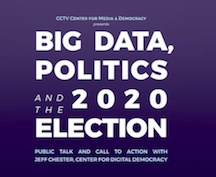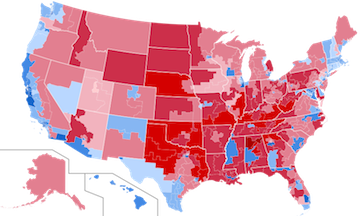
Publishings Digital Citizen
Program Areas
-
The European General Data Protection Regulation (GDPR) will take effect May 25, 2018. The Trans Atlantic Consumer Dialogue (link is external) (TACD), of which CDD is a member, published a document detailing 10 things that US citizens and companies need-to-know about the forthcoming General Data Protection Regulation (GDPR).
-
Press Release
Consumer groups in the U.S. and EU urge Facebook to adopt the General Data Protection Regulation as a global baseline standard
In an open letter to Facebook's CEO Mark Zuckkerberg, members of the Transatlantic Consumer Dialogue urge the company "to confirm your company’s commitment to global compliance with the GDPR". -
In a statement issued today, CDD, EPIC and a coalition of consumer groups have called on the Federal Trade Commission to determine whether Facebook violated a 2011 Consent Order (link is external) when it facilitated the transfer of personal data of 50 million Facebook users to the data mining firm Cambridge Analytica. The groups had repeatedly urged (link is external) the FTC to enforce its own legal judgements. "The FTC's failure to act imperils not only privacy but democracy as well," the groups warned.
-
Can Democracy Survive Big Data & Micro-Profiling in Elections? (CPDP 2018 Video)
Organized by Center for Digital Democracy & Transatlantic Consumer Dialogue
Today’s political candidates and issue campaigns are fully integrated into the growing Big Data marketing infrastructure, with more and more companies in this sphere accelerating the pace of research and innovation and promising to transform how political campaigns and elections are conducted. Data management platforms, marketing clouds, and other new data services enable information about one’s finances, health, race, ethnicity, shopping behavior, and geo-location to be combined with political interests, reading habits, and voting records. Social media and digital platforms are facilitating many of these techniques, monetizing and normalizing “fake news,” “dark posts”, and other practices, and challenging fundamental principles such as privacy, data protection, and individual autonomy. It has been widely reported that political Big Data digital micro-targeting played a role in the election of President Trump as well as the Brexit vote in the UK, and is now the subject to growing scrutiny by regulatory authorities. Is the use of such technologies likely to cause harm and undermine the democratic process? What is the link between these technologies and fake news? How do policy frameworks in western democracies compare, in terms of controlling political election campaigns practices? What is the role of data protection legislation in protecting the privacy of voters? And what are the challenges for data protection authorities in addressing how commercial data can be sold or shared with political groups? --- Chair: Paul-Olivier Dehaye, PersonalDataIO (CH) Moderator: Anna Fielder, Transatlantic Consumer Dialogue (UK) Speakers: Michael McEvoy, Office for Information and Privacy Commissioner of British Columbia (CA); Irina Vasiliu, DG Justice, European Commission (EU); Jeffrey Chester, Center for Digital Democracy (US); Juhi Kulshrestha, Hans Bredow Institute for Media Research (DE) -
Press Release
Death of Net Neutrality Will Spur Greater Loss of Digital Privacy, Further Content Consolidation & Control
Statement of Jeff Chester, CDD
The phone and cable lobby will use its new power over the Internet to further erode the privacy rights of Americans. Comcast, AT&T, and Verizon will be entirely free to tap into the data flowing from our mobile devices, PCs, gaming and streaming platforms and set-top boxes. These ISP giants have already built up a formidable (link is external) commercial data gathering and Big Data analytics infrastructure. Now they will expand their gathering of our personal information, inc. financial, health, media use, and also force competitors to share the data they collect. If you want ISPs to give you preferential treatment, content providers will be forced to give up your data, so phone and cable can further expand their ad revenues. Independent and small content companies—including non-commercial and diversely-owned services—will be pressed to consent to terms that favor the digital gatekeepers that control our broadband highway. The FCC’s Net Neutrality decision will trigger a powerful wave of consolidation and deal making that further reduces the range of content and services we should expect in the 21st Century (including for children). We also believe that Google, Facebook and other providers will likely make their peace with the big ISPs, creating a powerful alliance that controls the U.S.’s digital destiny. CDD will be a part of the collaborative work to address this. We urge everyone to also “follow the data” as they examine the digital marketing plans of Verizon, Comcast and AT&T (link is external). There they will find plenty of opportunity to educate the public about our digital future has been placed at great risk. -
Press Release
Federal Election Commission (FEC) Must Hold Hearings on Role of Digital Media in Political Campaigns
The Center for Digital Democracy calls on the Federal Election Commission (FEC) to hold hearings examining the role that the Internet and related digital data applications now play in federal political campaigns. The public needs a better understanding of how contemporary digital practices in the “Big Data” era affect our electoral system. CDD also urges the FEC to begin a rulemaking to revise its regulations concerning disclaimers so the public has appropriate access to information regarding the operations of online ads and related content. “The FEC must hold hearings to examine how, in this era of “Big Data” and personalized digital marketing, the unrestricted use of consumer information for political targeting may threaten our democratic process,” said Katharina Kopp, policy director of the Center for Digital Democracy. “Political campaigns now have access to an array of details on individuals that wasn’t previously available, including what they do online and offline. As we witnessed last year, this new capability can be used to engage in online suppression tactics to dissuade individuals and groups from voting. We urge the FEC to examine how digital data-driven campaigns may disenfranchise communities of color and economically at risk individuals." --- For more information, please see the attached media advisory and comment by the CDD. -
Political Microtargeting Threatens Privacy, Integrity of Voting Process
Big Data Election Marketing Practices Require Regulation, Safeguards
Haystaq DNA brings predictive analytics to election races up and down the ballot everywhere from presidential to city council elections. Haystaq provides support to political campaigns in need of using voter file data along with custom turnout scors, candidate support, issue scores and fundraising scores to reach voters most efficiently using a myriad of marketing tactics. --- --- For more information, visit http://bit.ly/2yrKQ0u (link is external) -
Google Brings Big Data Personalized Ad Targeting to TV
Smarter TV Ad Breaks Automatically Optimize Your Ad Break to the Revenue-Maximizing Combination of Ads, Personalized and Relevant for Each Viewer
Google's DoubleClick team October 2017 Opt-Ed piece: I believe that the future of TV is one that’s smarter — that brings together the TV content you love with the seamless experience of digital — on every screen or surface. Building towards that future, at our Partner Leadership Summit in Chicago early this month, we announced several new products and features to DoubleClick for Publishers, made for our TV. Video ad experiences get smarter, live and on-demand, with Dynamic Ad Insertion Over the years, we’ve rebuilt our video platform from the ground up — we knew that TV was a very different experience from the web and we knew that broadcasters had different challenges, infrastructure, distribution partners and content from web publishers. With TV coming to digital, we put our stake in the future of building for a better user experience — one that was connected, always on, and on-demand. Powering dynamic ad insertion has become a leading benefit of our platform. Over the last couple of years, we’ve successfully powered dynamic ad insertion for live streaming and on-demand content for many of the largest news, sports events and episodic premiers. In fact, over the past two years alone we’ve seen a 4X increase in ad impressions delivered via our Dynamic Ad Insertion product by TV partners like CBSi, AMC, Bloomberg, TF1 (link is external) and many more. Smarter TV ad breaks optimize revenue within each pod, programmatically We’re also bringing new updates to a key feature of our platform — smarter TV ad breaks. With this update, ad slots no longer need to be sold as fixed lengths in the break. Smarter TV ad breaks automatically optimize your ad break to the revenue-maximizing combination of ads, personalized and relevant for each viewer. For example, a ninety second ad break can now be filled by two 15-second and two 30-second ads or one 15-second, one 60-second and two 6-second bumper (link is external) ads depending on what will bring you the most revenue. Importantly, we’re able to do this across your programmatic or reservation deals, while respecting your business rules, such as competitive exclusions and frequency capping within the break or stream. Content gets smarter with TV Content Explorer To effectively monetize TV content, you need a platform that can better understand the content you’re monetizing, the audiences engaging with it and serve the right ad in just the right moment no matter where users are consuming it. That’s why we’re launching TV Content Explorer in DoubleClick for Publishers, available in beta by the end of 2017. Leveraging Google’s machine learning expertise and smart heuristics, TV Content Explorer creates and automatically organizes an intuitive catalog of your shows and clips. We analyze millions of signals from video content feeds, automatically applying classifiers and making recommendations for how content should be organized across dimensions like show, genre, trending, dayparts, etc. With this inventory catalog, you’ll get a clearer view of the opportunities and packages available to sell. But that’s not all. To ensure that you aren’t leaving any revenue on the table, the Explorer will also proactively surface deeper insights into audiences and monetization opportunities via insight cards (link is external). We’re just scratching the surface of what’s possible with this feature and are excited to bring even more innovation to this Explorer in the future. --- For the full article, please visit http://bit.ly/2zvJUEk (link is external) -
Google Continues Big Data-Driven Tracking and Analyzing of Individuals for Cross-Device Targeting
Presented by the Google Agency blog "Introducing Ads Data Hub: Next generation insights and reporting"
Mobile has fundamentally changed how we live our lives. With our devices never more than an arm’s length away, people can find, watch or buy anything at anytime. That’s why earlier this year we shared (link is external) that we’re developing a new, cloud-based measurement solution for YouTube, designed for a mobile world. Today, we’re announcing the beta for this solution, Ads Data Hub, to help advertisers get more detailed insights from their campaigns across screens while also protecting user privacy. We are also announcing that Ads Data Hub is a solution not just for YouTube, but a tool that offers access to more data and helps unlock actionable insights across Google ad platforms, including the Google Display Network and DoubleClick. And with Ads Data Hub now in beta, we’re expanding who can use it. Built on infrastructure from Google Cloud, including BigQuery (link is external), Ads Data Hub gives advertisers or their preferred measurement partners access to detailed, impression-level data about their media campaigns across devices in a secure, privacy-safe environment. Data from other sources, such as a CRM system or marketing database, can be incorporated as well. With this full view, advertisers or their partners can analyze the data and draw out insights specific to their business. For example, if an e-commerce retailer wants to understand what the path to conversion looks like, they can bring additional online data about their customers into BigQuery, and Ads Data Hub will enable them to combine that data with their ads data so they can see what a typical journey is from first encountering a user until conversion. Consistent with our commitment to privacy (link is external), no user-level data can be removed from the secure Cloud environment. Impression-level data is only accessible for the purposes of analysis and generating insights. In the future, advertisers will be able to act on the insights they get from Ads Data Hub and buy media with greater precision. As an early alpha partner, Omnicom Media Group helped to define the solution and has seen significant value from both the amount of data available through Ads Data Hub and the broad set of analyses and custom queries that are possible. --- For the full blog post, visit http://bit.ly/2yBWYv1 (link is external)



